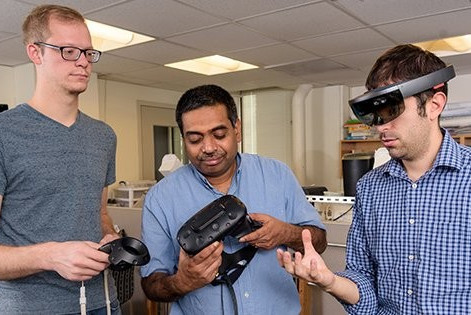Chandra Kambhamettu, an accomplished researcher in advanced computing, will join the University of South Florida (USF) this fall, bringing his extensive experience and a multimillion-dollar research portfolio. Kambhamettu’s career has been driven by the pursuit of using advanced computing to tackle pressing real-world challenges, from hurricane dynamics to biomedical imaging and environmental change. His new position at USF’s Bellini College of Artificial Intelligence, Cybersecurity and Computing marks a significant step in his commitment to interdisciplinary collaboration and innovation.
From Early Curiosity to Groundbreaking Achievements
Kambhamettu’s interest in technology began at a young age, inspired by his father’s work in computing. Observing punch cards being used to command computers sparked his curiosity, leading him to pursue a master’s degree and later a doctorate in computer vision at USF. Under the guidance of faculty like Dmitry Goldgof, he explored fields such as artificial intelligence and facial recognition, resulting in early publications and presentations at prestigious conferences.
His career took a pivotal turn when he joined NASA’s Goddard Space Flight Center in the early 1990s. There, he developed algorithms that analyzed hurricane imagery in near real-time, transforming satellite data into operational code for estimating storm strength and trajectory. Kambhamettu’s innovative stereoscopic imaging methods significantly advanced hurricane visualization, earning him NASA’s Outstanding Scientist Award in 1996.
Kambhamettu’s accolades continued to grow, including the National Science Foundation’s NSF CAREER Award, which honors early-career researchers who excel in teaching and scholarship. His research has not only garnered institutional recognition but also demonstrated a sustained impact across various fields, reinforcing the importance of real-world applications in computing.
Bridging Disciplines for Lasting Impact
Throughout his career, Kambhamettu has emphasized the importance of interdisciplinary collaboration. His work spans multiple domains, including aerospace, agriculture, and environmental monitoring. He has partnered with experts in oceanography, radiology, and environmental engineering, showcasing the versatility of AI and computer vision in addressing significant global issues.
“If your research has no impact outside of your discipline,” Kambhamettu states, “you’re not asking a big enough question.” This philosophy guided his transition back to academia after his tenure at NASA, where he sought to expand his research horizons. At the University of Delaware, he directed the Video/Image Modeling and Synthesis Lab and led projects totaling over $15 million in sponsored research from agencies such as the NSF and the National Oceanic and Atmospheric Administration.
One of his notable contributions to the field is a paper titled “Deeply-Learned Feature for Age Estimation,” which introduced a deep learning methodology for estimating age from facial images. This work set a new standard in accuracy, overcoming challenges related to variations in lighting and expression. The significance of this research was recognized with the 2025 “Test of Time” award from the Winter Conference on Applications of Computer Vision, underscoring its lasting influence in computer vision and biometrics.
Kambhamettu has also worked on projects that address critical societal needs, such as detecting hidden landmines using drone-mounted sensors that monitor ground heat signatures. His dedication to practical applications of computer vision extends to sectors like agriculture and retail, demonstrating the technology’s potential to enhance safety and efficiency.
As he prepares to return to USF, Kambhamettu aims to continue his impactful work while also shaping the next generation of researchers. He will teach graduate-level courses in computer vision and mentor both doctoral and undergraduate students. His arrival aligns with the ambition of the Bellini College to establish itself as a national leader in applied computing.
“Building a college around people who are pushing the boundaries of technology is exciting,” said Sudeep Sarkar, the launch dean of the college. “Dr. Kambhamettu is a respected thinker whose scholarship explores how technology can positively impact the world.”
Kambhamettu’s commitment to addressing crucial global challenges through advanced computing reinforces the vital role of interdisciplinary collaboration in research and education. As he embarks on this new chapter at USF, his influence is poised to resonate across various fields, inspiring future innovators to harness technology for meaningful change.
